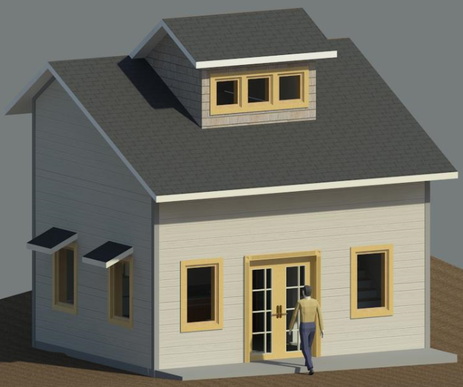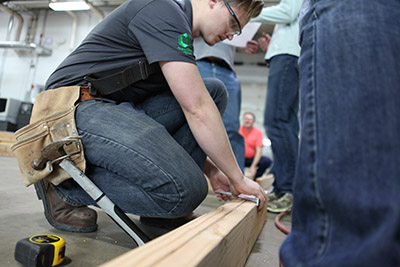WSU Students Build Tiny Studio with Tiny Environmental Impact
OGDEN, Utah — Ogden’s first net-zero tiny studio will have just 498 square feet of floor space, but a team of Weber State University students has big plans for the small structure.
Students in design engineering technology, manufacturing engineering technology and electrical engineering programs at WSU are spending their senior year designing and building the space. Together, they will create a highly efficient, net-zero studio, which annually will produce at least the same amount of energy it uses.
 “We are trying to prove that a well-designed small space can be functional and comfortable, not to mention super green,” said Jeremy Farner, design engineering technology associate professor and tiny studio faculty advisor.
“We are trying to prove that a well-designed small space can be functional and comfortable, not to mention super green,” said Jeremy Farner, design engineering technology associate professor and tiny studio faculty advisor.
The tiny studio will be located in the backyard of geography professor Julie Rich and her husband Deon Greer, retired geography professor. The foundation has been poured, and onsite framing begins March 18 and continues every weekend through the end of the semester at 1748 E. 4600 S. Ogden, Utah.
Once the studio is completed, it will function as a living laboratory. Students will use the space as a classroom to learn about green building and sustainability. Community members can visit the studio to learn more about increasing efficiency.
“As more and more pressure is put on Earth’s resources, we need to look at alternative ways to make our homes more efficient,” Rich said. “It is a privilege to be working alongside WSU students to make this project a reality.”
The team is outfitting the studio with all electrical appliances, so solar energy can provide the electricity. Students calculated the estimated electricity consumption and sized an array of solar panels to offset the annual energy usage. The system will be grid-tied, meaning any surplus power is fed into the grid and can be used at night when the solar panels aren’t producing energy.
Since the studio is small, the students have worked hard to efficiently use every inch of space and provide basic amenities. The bottom level will have a living/work space. A set of stairs will lead to a second-level loft area.
“I think we’ve finally surpassed the era of ‘bigger is better’ and arrived at ‘less is more,’” said Forest Allen, a senior working on the project. “We’ve been finding ways to preserve the future without compromising the luxuries in the present. We can now build better instead of bigger, and for a much cheaper price tag.”
The teammates have put extensive effort into choosing the most sustainable products for the studio. Even the insulation was selected with consideration for how much carbon is emitted during manufacturing and whether or not it can be recycled at the end of its lifetime.
 “We need people to realize they can live with less, but not necessarily a lower quality of life,” said Jason Sylvester, the team’s project manager and senior in manufacturing engineering technology. “If we keep going down the road that we’re going, it’s going to be a problem. If everyone tries to live the same standard that we are currently on, there’s not going to be enough resources for everybody.”
“We need people to realize they can live with less, but not necessarily a lower quality of life,” said Jason Sylvester, the team’s project manager and senior in manufacturing engineering technology. “If we keep going down the road that we’re going, it’s going to be a problem. If everyone tries to live the same standard that we are currently on, there’s not going to be enough resources for everybody.”
To take resource conservation a step further, lumber from an existing shed on the site will be repurposed and used as siding for the new structure. The studio will also have a rainwater system, which will capture and recycle water to use for plants and gardens.
“The students are forging ahead with innovative design ideas and learning how to fit it all into a space that is just under 500 square feet,” Rich said. “It is an exciting project to be involved in.”
To learn more about the net-zero tiny studio, visit net-zerostudio.weebly.com.
Visit weber.edu/wsutoday for more news about Weber State University.
For high resolution photos, please visit the following link:
Rachel Badali, Office of Marketing & Communications
801-626-7295 • rachelbadali@weber.edu- Contact:
Jeremy Farner, Design Engineering Technology associate professor
801-626-6962 • jfarner@weber.eduJulie Rich, Geography associate professor
801-626-6209 • jrich@weber.edu